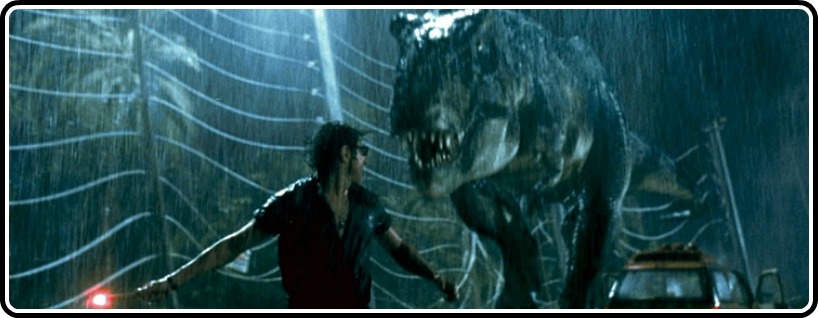And just like that, 20 years has flown by in the cinematic equivalent of a blink of an eye.
20 years ago this year, Steven Spielberg hit the world in the face with the cinematic event picture known as Jurassic Park. With groundbreaking visual effects work, a John Williams score that introduced a generation of youngsters to the power of a potent Williams theme (try getting this film’s main theme out of your head) and an action packed narrative, Jurassic Park has become one of the most iconic works from a filmmaker who seems to only be able to make films that have a long lasting impact.
However, Universal has post-converted the film into 3D, pumped it back into theaters, and even in some cases blew it up for IMAX screens, in honor of its 20th release this past Friday, and in turn given us a chance to truly re-evaluate the film’s impact, greatness and possibly its timelessness. Does it live up to the memories one has of seeing it for the first time?
Ultimately, for me at least, it’s a yes, but with a few reservations.
Let me get this out of the way. Jurassic Park was a formative piece of cinema for me. Much in the same way that the late, great, Roger Ebert hit me at the perfect, formative time in my life, this film is the first real cinematic experience that I remember as if it was just yesterday. I remember the theater I was at, the taste of the stale popcorn, and even sitting firmly in between my mother and father, with the anticipation of a kid on Christmas morning. Therefore, this is a film that has passed anything resembling a critically sound film. It’s akin to trying to trying to say whether or not you love your child. Of course I loved this movie.
But that said, being 24 now instead of four, the film has aged in a way one couldn’t really expect.
The post-conversion is solid. 3D-wise, the film didn’t seem to really need the conversion, but there were very few glaring issues with it. The conversion didn’t take to well to motion here, and neither did the effects, but it’s a perfectly serviceable bit of gimmick-addition.
The film’s pacing was what shocked me, and is the one thing that doesn’t seem to have aged all that well, now looking at the film from an almost solely critical level.
If this film’s plot were a line graph of action, it would look like the damn Appalachians. With seemingly very little progression from scene to scene, the film’s pacing was all over the place, jumping from scenes like two kids eating ice cream to a velociraptor chase in a matter of seconds. Clocking in at just over two hours, the film takes a few moments to truly set up the characters we are going to spend time with (or at least our two main leads) but when it comes to those characters that we are supposed to find issues in their motives, we know very little about the said motives.
But does that play into the film’s ultimate theme? Spielberg hasn’t been a filmmaker to really hide his themes, and here is no different. There is one scene in particular, a dinner sequence between all parties involved, that finds each main character posit their beliefs about the God-like power being wielded by this group of scientists. They have bested God, in their eyes. If dinosaurs were truly selected by nature to be wiped off the planet, then these men and women have bested God. However, one of the film’s biggest reveals is ultimately one of its smallest, and we discover that this God-like power, when unchecked, is as dangerous as having the power in the first place. It’s a really intriguing film to meditate on, when Spielberg allows for meditation instead of verbalizing.
But there is an energy here that is inescapable. When we see the dinosaurs for the first time, Spielberg hits us with one of the most definitive “Spielberg Face” moments, where we the audience are truly encompassed by the reaction of those on screen. Even 20 years later, this film still has moments that have an uncanny ability to leave jaws on the floor. And in that, for a film that inspired an entire generation of computer effects, is the film’s ultimate brilliance. Still a living, breathing bit of cinema, this is as timeless a film as Spielberg has in his canon.




![Bergman Island (The Criterion Collection) [Blu-ray]](https://criterioncast.com/wp-content/uploads/2022/11/bergman-island-the-criterion-collection-blu-ray-400x496.jpg)
![This Is Not a Burial, It’s a Resurrection (The Criterion Collection) [Blu-ray]](https://criterioncast.com/wp-content/uploads/2022/11/this-is-not-a-burial-its-a-resurrection-the-criterion-collection-blu-ray-400x496.jpg)
![Lars von Trier's Europe Trilogy (The Criterion Collection) [The Element of Crime/Epidemic/Europa] [Blu-ray]](https://criterioncast.com/wp-content/uploads/2022/11/lars-von-triers-europe-trilogy-the-criterion-collection-the-element-of-400x496.jpg)
![Imitation of Life (The Criterion Collection) [Blu-ray]](https://criterioncast.com/wp-content/uploads/2022/11/imitation-of-life-the-criterion-collection-blu-ray-400x496.jpg)
![The Adventures of Baron Munchausen (The Criterion Collection) [4K UHD]](https://criterioncast.com/wp-content/uploads/2022/11/the-adventures-of-baron-munchausen-the-criterion-collection-4k-uhd-400x496.jpg)
![Cooley High [Criterion Collection] [Blu-ray] [1975]](https://criterioncast.com/wp-content/uploads/2022/11/cooley-high-criterion-collection-blu-ray-1975-400x496.jpg)